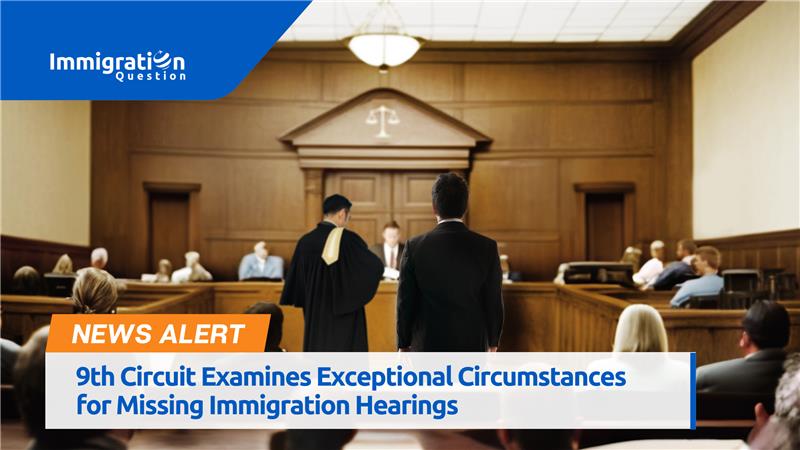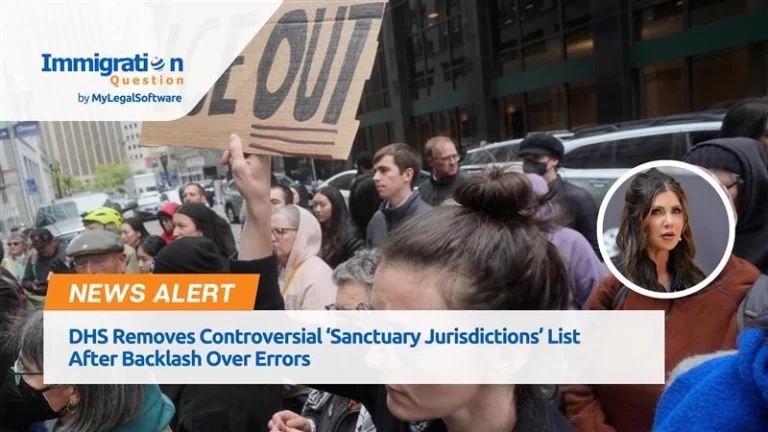Ninth Circuit Examines Exceptional Circumstances for Missing Immigration Hearings
In a recent ruling, the Ninth Circuit clarified what constitutes “exceptional circumstances” for missing an immigration hearing. This decision by the Appeals Court could significantly impact future cases involving ‘in absentia’ removal orders.
The case, Claudia Elena Montejo-Gonzalez v. Merrick B. Garland, involved a petitioner who, due to unforeseen delays caused by multiple car accidents, was unable to attend her scheduled removal hearing. The court ruled in favor of reopening the case, setting a notable precedent for the evaluation of exceptional circumstances in such scenarios.
Background of the Case – Ninth Circuit Examines Missing Immigration
In the United States, non-citizens facing deportation (removal) have the right to be heard by an Immigration Judge. However, if an individual misses their hearing without a valid reason, they may be ordered removed in absentia. However, there is a possibility of reopening the case if the non-citizen can demonstrate “exceptional circumstances” beyond their control that prevented them from appearing at the hearing.
The Details of the Case – Ninth Circuit Examines Missing Immigration
Claudia Elena Montejo-Gonzalez and her two children entered the United States in 2018, seeking asylum and protection under the Convention Against Torture (CAT). Their claims were based on life-threatening encounters with a gang member in their home country. On the day of their scheduled hearing in Seattle, Montejo-Gonzalez and her children faced significant delays caused by two major car accidents, leading to a two-hour late arrival at the courthouse. Despite their efforts to have their case heard upon arrival, the immigration judge ordered their removal in absentia.
Montejo-Gonzalez promptly filed a motion to reopen the case, citing these traffic-related delays as exceptional circumstances. However, both the Immigration Judge and the Board of Immigration Appeals (BIA) denied the motion, stating that traffic congestion alone does not qualify as an exceptional circumstance under immigration law.
The Ruling of the Ninth Circuit Examines Missing Immigration
Upon review, the Ninth Circuit panel, led by Judge Roopali H. Desai, disagreed with the Immigration Judge and Board of Immigration Appeals rulings, stating that both failed to consider the totality of the circumstances. In particular, the Ninth Circuit laid emphasis on the fact that the petitioners had taken reasonable steps to attend the hearing on time and that the traffic accidents were unforeseen events beyond their control. The court also noted that Montejo-Gonzalez and her children had no motive to evade the hearing and had actively attempted to have their case heard once they arrived at the courthouse.
The Ninth Circuit ruled that the Immigration Judge and Board of Immigration Appeals erred by not considering the combination of factors that amounted to exceptional circumstances, including:
- The petitioners left home early and took proactive steps to reach the courthouse in time, demonstrating diligence and intent to comply with court procedures.
- The two major car accidents were extraordinary and outside the petitioners’ control, making their late arrival unavoidable.
- Montejo-Gonzalez and her children had no intention of evading the hearing, as they were actively pursuing asylum and other protections.
- The ruling also highlighted the potential severe consequences of the removal order, especially for Montejo-Gonzalez’s children, who were eligible to seek derivative citizenship through their father, a lawful permanent resident on the verge of naturalization.
Based on these findings, the court ruled that the petitioners were entitled to a reopening of their removal proceedings.
How the Ruling Impacts Immigration Law on a Broader Spectrum
This ruling has several critical implications for immigration law, particularly in cases involving in-absentia removal orders. The Ninth Circuit’s decision reinforces the principle that immigration judges and the Board of Immigration Appeal (BIA) must take into account the full context of each case, rather than applying a rigid, one-size-fits-all standard.
- The Ninth Circuit expanded the definition of exceptional circumstances beyond severe illness or death, allowing events like traffic accidents to qualify if petitioners made efforts to attend their hearings.
- Immigration courts must now evaluate multiple factors, including intent, compliance efforts, and the consequences of removal orders, rather than relying on a single factor when assessing exceptional circumstances.
- The ruling may allow more leniency in cases where individuals miss hearings due to unforeseen events, providing petitioners a stronger case to reopen proceedings if they made reasonable efforts to attend.
- The decision also emphasizes the need to protect vulnerable individuals like asylum seekers and children, recognizing the severe impact of removal orders on families and minors.
Despite the majority ruling, Judge Collins dissented, warning that the ruling lowers the threshold for exceptional circumstances, potentially burdening the immigration system with more reopened cases due to common occurrences like traffic delays.
Looking Ahead – Ninth Circuit Examines Exceptional Missing Immigration Hearings
The Ninth Circuit’s ruling in Montejo-Gonzalez v. Garland represents a significant development in immigration law, particularly in the context of in absentia removal orders.
As immigration law constantly evolves, this ruling would likely serve as a significant reference point for future cases involving missed hearings and motions to reopen. This would offer a ray of hope to petitioners facing similar challenges navigating the very complex immigration system.
To stay updated and informed, keep an eye out for our news section or drop your immigration queries for professional attorneys to reply on Immigration Question.










